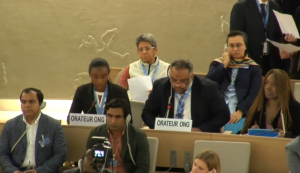On March 8, 2016, at the 31st session of the Human Rights Council, Ibrahim al-Demistani delivered an oral intervention at the Item 3 Interactive Dialogue with the Special Rapporteur on Torture, in which he addressed the continuing torture and ill-treatment of prisoners in Jau Prison, including the prisoners’ lack of much needed medical care.
Please continue reading for his full remarks, or click here for a PDF of his statement.
الرجاء الضغط هنا لقراءة هذه الرسالة باللغة العربي
Mr. Rapporteur,
Alsalam Foundation, together with Americans for Democracy & Human Rights in Bahrain, the Bahrain Institute for Rights and Democracy and the Bahrain Center for Human Rights, would like to thank you for your mandate’s communication on the widespread and systematic use of torture and inhuman treatment as a form of collective punishment following clashes in Bahrain’s Jau Prison last year.
Since that time, conditions in Jau Prison have not improved. We continue to receive an uninterrupted stream of new reports of torture and ill-treatment, particularly against political prisoners and prisoners of conscience who are facing harsh and vague conditions that prevent them from meeting with their lawyers or have their lawyers attend their interrogation.
Among the new reports of torture was the cases of the Fakhrawi brothers, Mohammed and Ali, who were arrested and subjected to repeated and violent torture by prison officers. After prolonged and intense torture, the brothers were coerced into signing forced confessions and have not been tried until now.
Furthermore, many inmates in Jau are in dire need of medical care which prison officials are unable or unwilling to provide. We have received reports of tens of prisoners in need of care; prisoners like Ilyas Almulla, Hisham Alsabagh, Adel Ayoub, Sayed Sadiq Alalawie, Jaafar Maatoq, Ali Ibrahim Alzaki, Sadiq Alshabani, Ali Alsingace, Mohammad Fadhel, Mohammad Mirza, who remains in prison despite having served his time.
Finally, we are very concerned at the enforced disappearance and apparent torture of Ali al-Tajer, brother of the prominent Bahraini human rights lawyer, Mohamed al-Tajer. Ali was disappeared for over 40 days in late 2015 and subjected to torture in order to coerce a confession.
He is detained on the basis of fake accusations and has not been tried in order to extract more confessions. We therefore ask if your office has received any satisfactory response from Bahrain regarding these cases, or your outstanding requests for a country visit?
Thank you.





